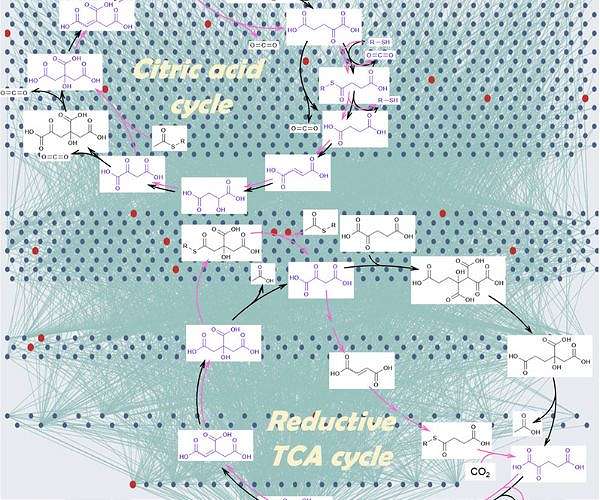Revolutionizing Chemistry: Over 4 Billion Early-Life Reactions Simulated via Blockchain
by Clarence Oxford
Los Angeles CA (SPX) Jan 25, 2024
In a groundbreaking utilization of blockchain technology, a team of chemists has successfully repurposed the computational process typically used in cryptocurrency mining to simulate an unprecedented network of chemical reactions, potentially linked to the origins of life on Earth. This study, published in the journal Chem on January 24, marks a novel intersection of chemistry, computer science, and blockchain technology.
Led by senior author Bartosz A. Grzybowski of the Korea Institute for Basic Science and the Polish Academy of Sciences, the research team embarked on a journey to explore the primordial chemistry of early Earth. Grzybowski stated, “At this point, we can say we exhaustively looked for every possible combination of chemical reactivity that scientists believe to had been operative on primitive Earth.”
The project’s core involved constructing a vast network of chemical reactions, titled NOEL (Network of Early Life), starting from fundamental molecules like water, methane, and ammonia, believed to be abundant on the nascent Earth. The team established specific rules for potential chemical interactions and translated this complex data into a computer-readable format. Leveraging the blockchain, they effectively orchestrated the computation of these reactions across a global network of computers.
Grzybowski elucidates the process: “The computer takes the primordial molecules and the accepted prebiotic chemistries. We coded it into the machine, and then we released it onto the world.” The collaborative effort, involving Allchemy and utilizing the Golem platform, a global decentralized computing power network, facilitated the simulation of over 11 billion reactions, eventually narrowing it down to 4.9 billion plausible ones.
The NOEL network encompasses parts of well-known metabolic pathways, like glycolysis and the Krebs cycle, crucial for energy generation in organisms, and includes syntheses of 128 simple biotic molecules such as sugars and amino acids. Intriguingly, of the 4.9 billion reactions, only a few hundred were identified as self-replicating – a key aspect of the emergence of life, yet generally thought to require complex macromolecules like enzymes.
“Our results mean that with only small molecules present, self-amplification is a rare event. I don’t think that this type of self-replication was operative on primitive earth, before larger molecular structures were somehow formed,” explains Grzybowski. This finding nudges the scientific community to reconsider the mechanisms that might have led to the emergence of self-replicating systems and ultimately, life.
This research not only sheds light on the possible chemical pathways of early Earth but also exemplifies a transformative approach to scientific computing. Utilizing blockchain for scientific research democratizes access to computational resources. As Grzybowski notes, “Our system of education is based on elite universities mostly in the western world… But if you can distribute computing in this way for a fraction of the cost, you can give other people opportunities to play.”
The approach adopted by Grzybowski and his team circumvents the need for expensive, centralized supercomputers, offering a feasible alternative for institutions lacking such resources. “With a platform like Golem, you can connect your institution’s network and harness the entire idle power of its computers to perform calculations,” Grzybowski suggests, highlighting the potential for broader application and accessibility in scientific research.
Furthermore, this innovative use of blockchain challenges the conventional perception of cryptocurrency. Grzybowski expresses his vision for the future: “I hope people in computer science can figure out how can we tokenize cryptocurrencies in some way that can benefit global science… Maybe society could be happier about using cryptocurrencies if you could tell people that in the process we could discover new laws of biology or some new cancer drug.”
Research Report:Emergence of metabolic-like cycles in blockchain-orchestrated reaction networks.
Related Links
Cell Press
Lands Beyond Beyond – extra solar planets – news and science
Life Beyond Earth

